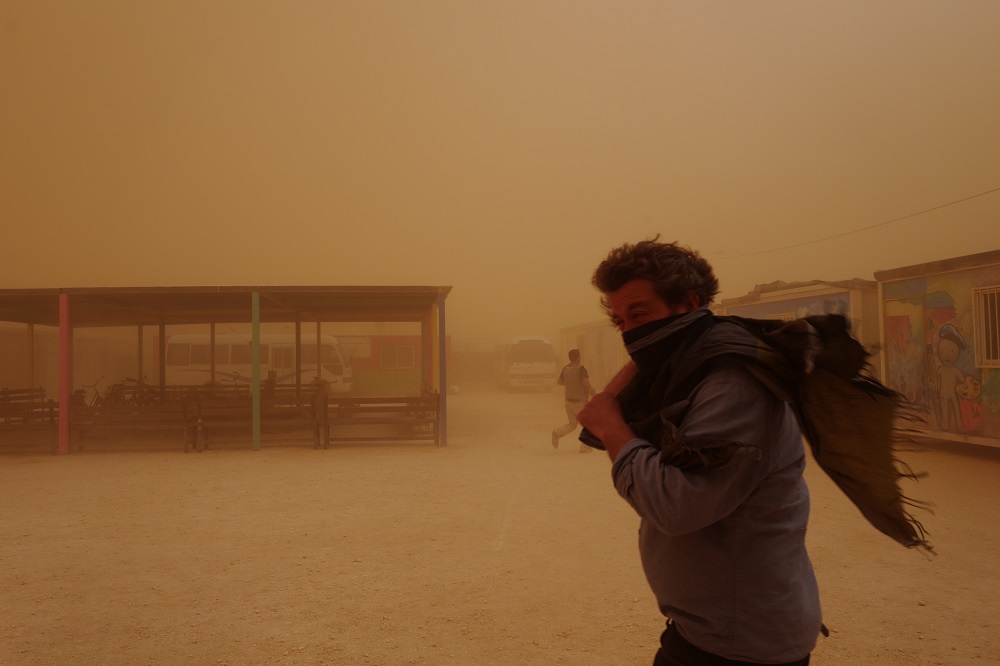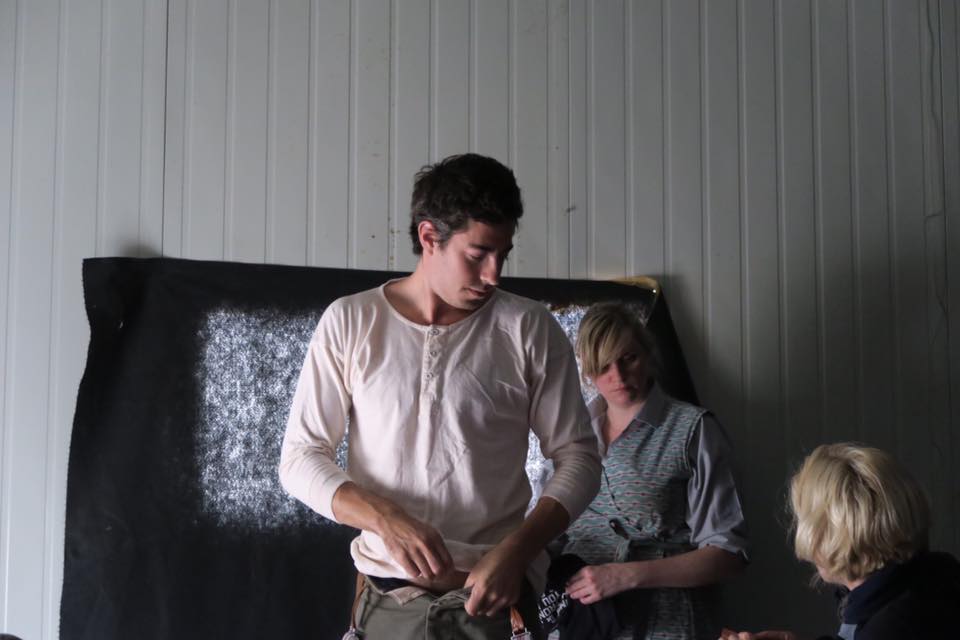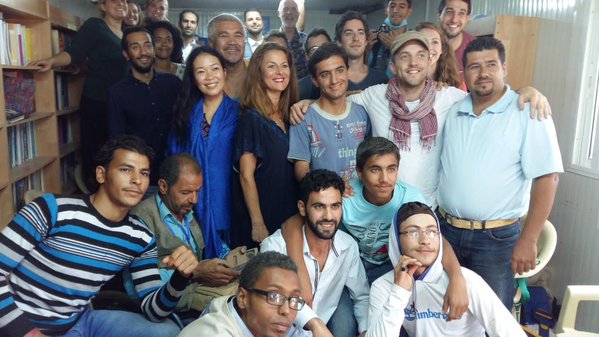It would have been impossible to go to Syria. Our plan to perform Hamlet in every nation in the world faced its biggest obstacle to date and the Globe producers were left pondering a Plan B. We considered performing in a Syrian embassy - technically Syrian soil - but playing to an audience of delegates would have missed the point a little. More important than the patch of ground we played on was the people to whom we were playing.
And so, waking early in Amman (after having performed in an inordinately beautiful, 2,000-year-old Roman theatre as our Jordanian stop the night before), we headed north of the capital to Za’atari refugee camp, a three-year-old settlement just south of the border with Syria. With 80,000 Syrian refugees living there, mostly youth, it has become the fourth-largest city in Jordan and is divided into 12 districts. Our 16-strong company, together with Globe artistic director Dominic Dromgoole (pictured below in a sandstorm), audience researcher Penelope Woods and Guardian photographer Sarah Lee, our set, costumes and musical instruments in tow, headed to District 2.
So many lines in the 400-year-old tragedy seemed to ring truer than ever
Impressive graffitti brightened the uniform grey and barb-wired buildings. As soon as we pulled up to the compound, a group of young boys shouted hellos and how-are-yous to us through the chain link fence. It was the extent of their English - and our Arabic - but a kid in a once-white Real Madrid shirt was the catalyst for an enthusiastic conversation consisting entirely of naming Spanish footballers. Beruce Khan’s Sunderland shirt had them a little stumped. We asked the IDR guys in charge if the boys could come in and have a kick-about, but were told they’d have to wait for 15 minutes for the compound to officially open. Ever accomodating throughout the day, but rules, in Za’atari, are rules.

When the audience arrived (some time after we were due to start - even within the camp it's a long walk for many of the residents unable to afford the bus service), they were boisterous, excitable and full of chatter. None of which altered after we began the play. The small hall was packed, with young children on their mothers’ laps or else squeezing between the plastic chairs, and groups of men stood huddled inside the door. They were about 200 people in all. There was none of the calm or quiet reverence one normally expects from an audience, but an active engagement instead; neighbours explained plot lines to each other and children escaped their mothers’ clutches to inspect the action more closely. A girl of around five or six was so intrigued by what Hamlet was setting down in his “tables” that she marched on stage and peered over his shoulder to inspect the notebook’s contents. We decided not to bother with our usual requests to prohibit the use of cameras - it seemed churlish to be precious about it under the circumstances. Many did snap away or film whole sections on their phones, one man even creeping on stage to capture a close-up of Polonius’s dead body. (Pictured below, Matthew Romain with stage manager Becky Austin. Photograph by Dave McEvoy)
 There was a buzz of excitement in the air, a constant thrum that underscored the action of the play. And even the elements joined in: halfway through, the wind picked up and the dust lifted; the sky turned yellow, then dark red, before plunging the room into total darkness. A sandstorm had arrived. Dozens of audience members gathered their belongings and their children and rushed, via the stage, for the exit, the wind and sand beating at the windows and finding its way inside through the cracks of the building. Later we were told they’d been worried for the rest of their families and had hurried to be with them. In the commotion we were forced to stop, mid-scene. Some of the braver children took the opportunity to examine our props more closely, testing the sharpness of our swords and fingering at our costumes. We resumed shortly after, by which time most people had returned to their seats or else left for their homes. With the sandstorm still raging outside, those of us with a few minutes' wait backstage between scenes wrapped our faces in scarves and sunglasses and dashed outside to feel the force of the gale, a thick fog of sand obscuring the recently familiar surroundings. Even a momentary forray outside was enough to embed grains of sand so deeply into the nooks and crannies of our persons that we’d be discovering them days and several showers later. Inside, our instruments and props were covered with a thick layer of dust.
There was a buzz of excitement in the air, a constant thrum that underscored the action of the play. And even the elements joined in: halfway through, the wind picked up and the dust lifted; the sky turned yellow, then dark red, before plunging the room into total darkness. A sandstorm had arrived. Dozens of audience members gathered their belongings and their children and rushed, via the stage, for the exit, the wind and sand beating at the windows and finding its way inside through the cracks of the building. Later we were told they’d been worried for the rest of their families and had hurried to be with them. In the commotion we were forced to stop, mid-scene. Some of the braver children took the opportunity to examine our props more closely, testing the sharpness of our swords and fingering at our costumes. We resumed shortly after, by which time most people had returned to their seats or else left for their homes. With the sandstorm still raging outside, those of us with a few minutes' wait backstage between scenes wrapped our faces in scarves and sunglasses and dashed outside to feel the force of the gale, a thick fog of sand obscuring the recently familiar surroundings. Even a momentary forray outside was enough to embed grains of sand so deeply into the nooks and crannies of our persons that we’d be discovering them days and several showers later. Inside, our instruments and props were covered with a thick layer of dust.
 The audience who did stay behind became increasingly absorbed. At Claudius’s death in the final scene, they cheered and applauded the long-awaited moment of revenge: the despot’s comeuppance. It is a rarity for us to have all 12 actors on stage at once; we swap round roles each performance allowing a few of us to be off on any given show. But this was an event none of us wanted to miss out on - day off or no day off - so we shared the parts between us and experienced the unique atmosphere together. So many lines in the 400-year-old tragedy seemed to ring truer than ever.
The audience who did stay behind became increasingly absorbed. At Claudius’s death in the final scene, they cheered and applauded the long-awaited moment of revenge: the despot’s comeuppance. It is a rarity for us to have all 12 actors on stage at once; we swap round roles each performance allowing a few of us to be off on any given show. But this was an event none of us wanted to miss out on - day off or no day off - so we shared the parts between us and experienced the unique atmosphere together. So many lines in the 400-year-old tragedy seemed to ring truer than ever.
After the show we met with students and members of a drama group within the refugee camp (pictured above by UNESCO Jordan). They had performed King Lear the year before, accompanied on instruments they’d made themselves. We swapped production stories via an interpreter and talked about our journey and theirs. An IDR worker in the camp told me he’d never liked theatre, but after seeing our Hamlet he’d “found a new love”. Miranda Foster asked for a traditional Syrian song for her collection and the whole room joined in in call and response, banging walls and tables as drums as they echoed the chant. One of the refugees said he hoped to welcome us back to Za’atari again, but he also hoped to welcome us in Syria one day. We hoped so too.
After some hurried goodbyes we left the camp, on strict orders to be out by 4pm. On the drive back to Amman one of Hamlet’s lines in particular stuck in my head. “I could be bounded in a nutshell and count myself a king of infinite space,” he says. “Were it not that I have bad dreams.” The next morning we woke early and crossed into the West Bank, heading for Ramallah, Palestine.
- Read theartsdesk's reviews of all 37 productions in the 2012 Globe to Globe festival
- Read all Matthew Romain's reports from the Hamlet tour for theartsdesk
- Read more guest features in theartsdesk's First Person column
- Hamlet: The Greatest Theatre Tour on Earth is an inside account of Globe tour written and produced by the company to raise money for Mary’s Meals. To purchase a copy send a cheque for £10.50 to Mary’s Meals c/o Keith Bartlett, 32 Gap Road, Wimbledon, SW19 8JG














Add comment